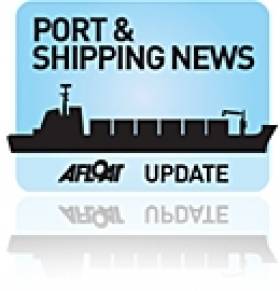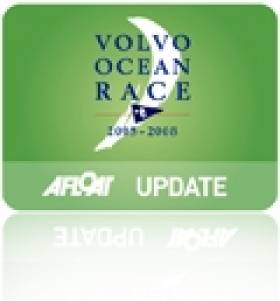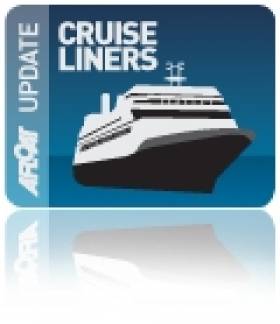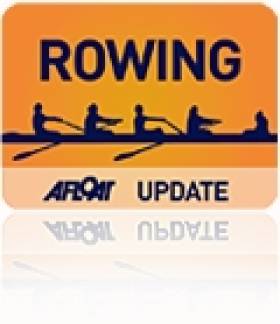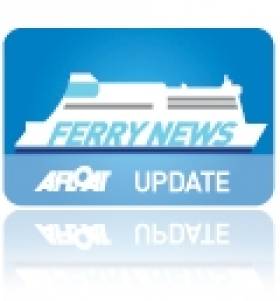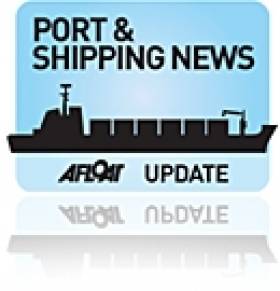Displaying items by tag: Rotterdam
Cracks in Hull Force Tanker Re-Routing to Belfast
#SHIPPING - The Irish Times reports that a tanker carrying hazardous cargo has been allowed to berth at Belfast Port after it reported a cracked hull off the north-west coast.
The 228-metre Germar Companion, which is is carrying 54,000 tonnes of vacuum gas oil, was on route from Rotterdam to New York when its crew discovered cracking in its upper deck some 25 miles off Tory Island.
The Air Corps and Naval Service were stood down after the cargo ship was granted permission to berth at Belfast, where its hull will be inspected.
Galway Hooker En Route to Abu Dhabi in VOR Cultural Exchange
A traditional Irish sailing boat is on the way to Abu Dhabi in a cultural exchange that will also see six Arabian dhows in Galway for the finish of the Volvo Ocean Race next summer.
The National reports that the near-century-old Galway hooker Nora Bheag is being transported to the United Arab Emirates as part of a Maritime Heritage Cultural Exchange initiative, co-ordinated by Irish expat Peter Vine. (Track its progress at marinetraffic.com.)
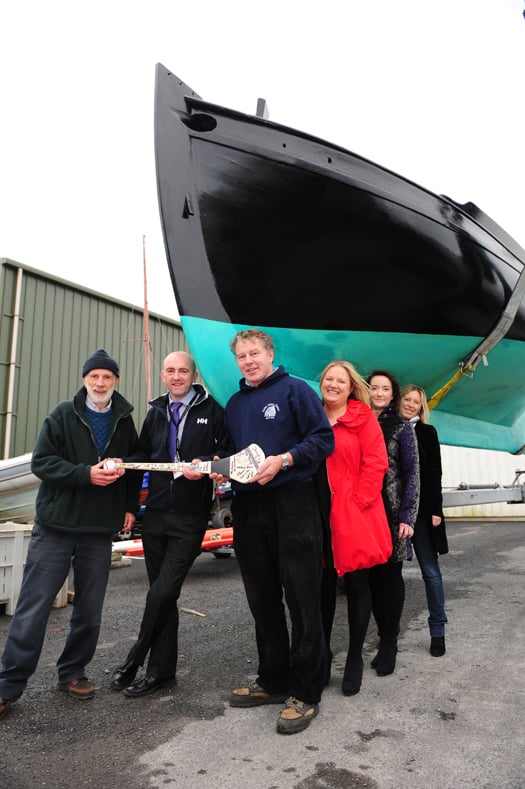
On her way: Nora Bheag heads for Abu Dhabi. Photo: Boyd Challenger
According to the Galway Independent, the boat is currently en route to Rotterdam in a container loaded with a small curach named Noa.
Plans to include turf and bottles of poitin were abandoned, however, due to customs concerns - instead two hurleys and a sliotar will make the trip.
Nora Bheag is expected to reach port by early December ahead of the Volvo Ocean Race fleet which arrives on 1 January, marking the first time the city has hosted and taken part in the race.
Vine says he came up with the idea of the boat swap because of the two countries' shared maritime heritage.
There are many similarities between hookers and dhows, too, from their comparable sail shapes to their usage for fishing and personal transport.
"This will be a huge common shared experience that will build true friendships and a real cultural exchange," said Vine. "I am hugely grateful to Emirates Heritage Club, which has done so much to revive Arabian dhows, for making such a project possible."
The National has more on the story HERE.
Meanwhile a delegation from Galway is set to travel to Spain later this week for the launch of the Volvo Ocean Race.
A week of events begins this Saturday ahead of the start of the race proper on 5 November in Alicante.
Not One Not Two but Three Cruise Callers to Cork
Next in terms of tonnage is Holland America Line's near 60,000 tonnes Rotterdam, for more about the 1997 built click this LINK. The final member of the trio belongs to Saga Cruises subsidiary Spirit of Adventure cruises, the 10,000 tonnes Spirit of Adventure. For a visual virtual tour of the vessels interior facilities click HERE.
Spirit of Adventure was scheduled in late April on a 14-day 'Relics of Rome' cruise which was to include ports of call to Libya, Tunisia and Egypt but this was cancelled due to the political situation throughout North Africa.
The combined cruise calls to Cork Harbour has a potential capacity of 5,200 passengers and the mid-July arrival confirms the ports popularity which is to welcome this year a total of 54 cruiseships and over 100,000 passengers. Azura and Spirit of Adventure are to share the berth at Ringaskiddy while the Rotterdam is to berth at the dedicated cruise terminal in Cobh.
Cork Crews Rise to the Top at Cork Head
Cork crews saw off rivals from far and near at the Cork rowing Head of the River at the Marina on Saturday. UCC’s men’s senior eight were the fastest men’s crew – by 1.3 seconds from De Maas of Rotterdam, a masters eight. The fastest women’s crew was Cork Boat Club’s junior 18 eight, adjudged just .8 of a second quicker than UCD’s women’s senior eight. The fastest men’s single sculler was John Keohane of Lee Valley and Karen Corcoran-O’Hare of Shandon was the fastest women’s single sculler.
Cork Head of the River, The Marina, Cork, Saturday
Overall: 1 UCC men’s senior eight 12 minutes 6.7 seconds, 2 De Maas, Rotterdam men’s masters eight 12:08.0, 3 UCC men’s novice eight 12:25.9, 4 UCD men’s novice eight 12:42.4, 5 Presentation College men’s junior eight 12:44.3, 6 Muckross intermediate eight 12:49.9.
Men, Eight – Senior: UCC 12:06.7. Intermediate: Muckross 12:49.9. Novice: UCC 12:25.9. Junior: Presentation 12:44.3. Junior 16: Cork 13:21.2. Masters: De Maas 12:08.0.
Fours – Senior: Cork/Garda 12:53.6. Intermediate: UCC 13:40.6. Novice: Cappoquin 13:43.9. Junior 18, coxed: Presentation 13:04.0
Pair – Junior 18: Presentation 14:58.7. Masters: De Maas 13:09.9. Coastal – Novice: Ahakista 17:28.7.
Sculling, Quadruple – Senior: Shannon 13:50.8. Novice: Shannon 15:07.4. Junior 18: Cork 13:05.3. Junior 16: Cork 13:15.2.
Double – Intermediate: Cork IT 13:41.6. Junior 18: Clonmel 13:53.9. Junior 16: St Michael’s 15:04.4. Coastal – Novice: Kilmacsimon 16:17.2.
Single – Senior: Lee Valley (J Keohane) 14:16.4. Intermediate: Lee (O’Connell) 14:53.4. Novice: Lee (O’Connell) 14:37.9. Junior 18: Workmen’s (Burns) 14:33.0. Junior 16: Shandon (Casey) 15:08.9. Masters: Skibbereen (Barry) 15:40.07. Coastal – Novice: Kilmacsimon 17:33.6
Women – Overall: 1 Cork junior eight 13:40.0, 2 UCD senior eight 13:40.8, 3 St Michael’s junior eight 13:54.1.
Eight – Senior: UCD 13:40.8. Novice: UCC 14:25.4. Junior 18: 1 Cork 13:40.0. Junior 16: Clonmel 16:21.0.
Four – Senior: Muckross 14:15.9. Intermediate: UCC 17:00.9. Novice: UCC 16:29.8. Masters: Skibbereen 22:34.9.
Pair – Junior 18: St Michael’s 15:00.2.
Sculling, Quadruple - Novice: Shannon 15:51.4. Junior 16: St Michael’s 15:16.5.
Double – Intermediate: UCC 16:15.1. Junior 18: Cork 14:43.9. Junior 16: Lee 15:42.3. Masters: Cork 15:38.3.
Single – Senior: Intermediate: Shandon (K Corcoran-O’Hare) 15:39.7. Junior 18: Lee (Kearney) 16:52.1. Junior 16: Lee (Hamel) 16:13.6. Masters: Cork (Crowley) 17:49.2.
Coastal: 1 Kilmacsimon men’s novice double scull 16:17.2, 2 Ahakista men’s novice quadruple coxed scull 17:28.7.
Click this link for Irish Rowing detailsClick this link for the Latest Rowing News
Seatruck Sailings Start on Dublin-Heysham Route
The vessel has accommodation for 12 drivers. Most of the daily sailings depart Dublin at 15:15hrs and return from the Lancashire port at 02:15hrs. On certain days the schedules vary, to view the timetable click here.
In addition to the new route for Seatruck Ferries, the freight-only operator has a fleet of 8 vessels on routes between Dublin-Liverpool, Warrenpoint-Heysham and Larne-Heysham.
Anglia Seaways arrived into Dublin yesterday morning from Avonmouth Docks, where the 120 unit capacity vessel went into temporary lay-up period, since departing the Irish capital on 31 January (see related posting and photo).
The 13,073grt vessel revived the 8-hour route yesterday with an afternoon sailing bound for Heysham. The vessel was originally reported to be relocated to Baltic Sea operations, but with its charter to Seatruck, the DFDS Seaways funnel symbol of the Maltese cross was painted out.
Though, the Maltese cross can still be seen in Irish ports with calls made by sisterships, Dana Gothia (ex. Maersk Westland) and Dana Hollandia (formerly Maersk Waterford) which are part of the DFDS Group container subsidiary DFDS Logistics.
In total the Lo-Lo shipping division operates four vessels on several routing options with weekly calls to Belfast, Dublin, Cork and Waterford to Rotterdam and Zeebrugge.
The German built sisters originally operated Dublin-Rotterdam and Waterford-Rotterdam routes for Norfolk Line (a subsidiary of Maersk / A.P. Moller Group).Incidentally Maersk /Norfolkline also owned the Anglia Seaways until DFDS Seaways purchased the vessel last year.
Car-Sales Boost Brings Busy Day to Dublin
Normally the Pauline operates on other routes. She along with her sister Yasmine are the largest vessels in the Compagnie Luxemburgeoise de navigation SA (CLnd) / Cobelfret fleet. The vessels are of the Con-Ro design, also known as the 'HumberMax' vessels which have 5,632 lane metres capable of carrying 258 container trailers and 656 cars.
Apart from the Dublin debut of the Pauline which docked at Ocean Pier, the final vessel of the trio, Celestine (1996 / 23,986grt) was the first to arrive from Zeebrugge, docking at the ferryport berth 51A (also used daily by Stena Line vessels). Like the Pauline, the Opaline (2009 / 25,235grt) docked at Ocean Pier and is the newest and last of six newbuilds built from German yard of FGS Flensburg.
CLnD won the Short-Sea Shipping Company Award in 2010 at the Irish Exporter Awards in November and hosted by the Irish Exporter Association (IEA). The award was sponsored by the Irish Maritime Development Office (IMDO) which recognises the strategically important role of short sea shipping to our island economy.
There are four sailings operated by CLnD between Dublin Port and Rotterdam / Zeebrugge. From the Dutch port there are onward sailings linking Göteborg and Esbjerg while the Belgian route connects the UK ports of Killingholme, Purfleet and Ipswich.
The development of the Irish routes are part of the "Motorways of the Sea", an EU-wide programme to promote a modal shift of goods from congested roads to alternative sea transportation. In addition to the concept is the international trend in the use of larger and more efficient vessels.
In October 2009 CLnD /Cobelfret switched their Irish operations from Rosslare to Dublin Port. The transfer to Dublin allowed CLnD to introduce larger tonnage at the then newly upggraded No. 2 ro-ro linkspan at Ocean Pier, Alexandra Basin East.
CLdN ro-ro SA and CLdN ro-ro UK offer ro-ro connections from Belgium and the Netherlands to the UK, Ireland, Sweden and Denmark. Both divisions share a combined core fleet of 20 vessels. Some ships including the Pauline are registered and flagged from land-locked Luxembourg. The fleet operate on short sea ro-ro trade routes, occasionally supplemented by time chartered tonnage, which accommodate trailers, containers, vehicles and other rolling equipment.



























